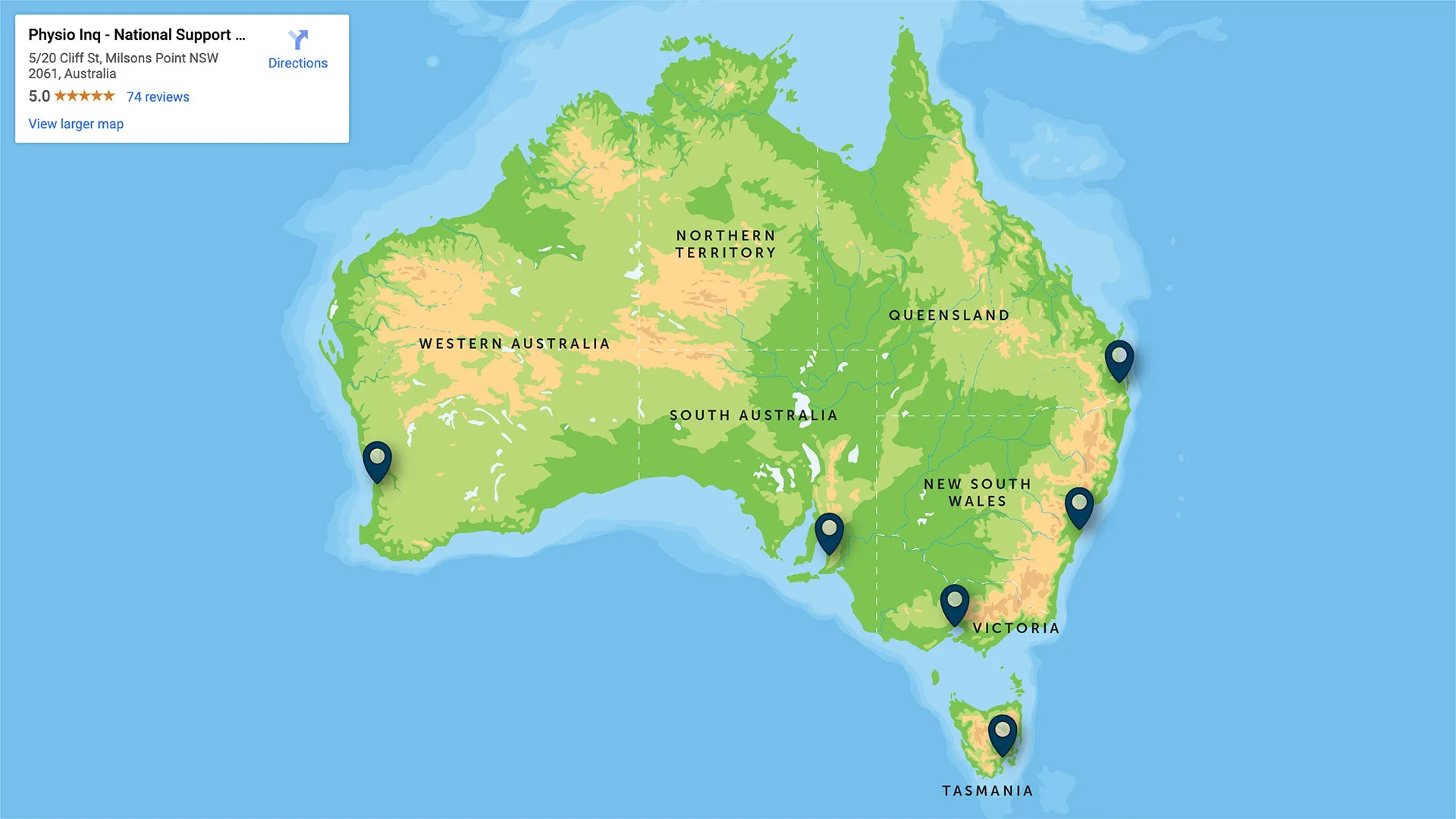How to Start a Small Business in Australia
Originally Published Nov 10, 2020
You're embarking on an exciting journey towards entrepreneurship, and we're here to guide you every step of the way. Starting a small business in Australia is a dream many cherish, and with the right preparation, you can turn this dream into reality.
In our comprehensive guide, you'll learn about:
1. Obtaining an Australian Business Number (ABN)
2. Understanding Development Approval (DA) applications
3. Establishing your business in Australia
4. Utilising social media for your business launch
5. Hiring and training staff
6. Creating operational systems for your new venture
How can Physio Inq help?
If you are considering starting a small business in the Healthcare industry, Physio Inq may be able to assist. We have over 15 years of experience in setting up and supporting small healthcare business owners running healthcare clinics. Click here to find out more or get in touch with our team, to discover the options Physio Inq can provide you.
Obtaining an Australian Business Number (ABN)
The first step towards launching a small business in Australia is applying for an ABN. This 11-digit number uniquely identifies your business or organisation to the government and the community.You're eligible for an ABN if you're:
• Starting or operating an enterprise in Australia
• Making supplies connected with Australia’s indirect tax zone
• A Corporations Act company
Even if your business is in its nascent stages, you're still entitled to an ABN. For instance, if you've begun activities such as setting up a website, acquiring business licenses, or leasing premises or equipment, you're eligible.
To apply for an ABN, visit the Australian Business Register website and provide the necessary details including Tax File Numbers (TFNs) for you and your associates, your Professional Advisor Number (if applicable), the date of expected business commencement, and more.
How do I know I need an ABN?
Definition of ‘Starting a Small Business’:Commencing a business is defined as a business or enterprise that is not yet underway. However, you’re still entitled to an ABN if you’ve already started with certain activities such as:
• Advertising, setting up social media, or a website for your new business
• Purchasing business cards or stationary
• Obtaining business licences or insurance
• Leasing or buying business premises, equipment, or stock
• Issuing quotes for work
• Consulting with financial, business, or tax advisors
• Applying for financing or grants
• Buying a business
If this sounds like you, then check out if you require an ABN. Otherwise, keep reading to learn more:

Understanding Development Approval (DA) Applications
DA stands for Development Approval. It signifies the permission granted by your local council to undertake development. This includes building work, plumbing, drainage work, and more. Each DA application is unique to your local council, so ensure you follow your city and state’s guidelines.The DA offers three kinds of consent:
1. Development Plan Consent
Development Plan Consent is council approval based on how much impact the new development will have on others.
2. Building Rules Consent
Building Rules Consent refers to approval on building codes, technical requirements, fire safety, energy efficiency, and other applicable regulations.
3. Land Division Consent
Land Division Consent refers to approval for changing property boundaries.
Often, these forms of consent will overlap.
So, if you’re starting a small business requiring the development of a new building, changing the way a building is used (such as repurposing a warehouse), or even installing new plumbing or drainage, you’ll need to complete a DA application.
Since DA applications are unique to each local council, be sure to apply for DA following your city and state’s guidelines.
Establishing Your Business in Australia
After obtaining your ABN and DA, it's time to set up the tangible aspects of your business. This includes creating a logo, ordering signage, building a website, and purchasing necessary equipment.These could include:
• Create a logo
Creating a logo can be daunting. It is important, but don’t spend too much time on this stage. Hire a graphic designer to create a logo for your business or do it yourself using a program like Canva or Adobe Photoshop.
• Order signage
Let people know you’re in business with signage. If you have a physical location, a sign for out front is an obvious consideration. But even if you’re an online business, you’ll want to order other marketing materials. That means branded packaging or web designs, for example.
• Build a website
In this day and age, every business needs a website. The internet is usually the first place people go to look for products and services. So, it’s important to have an online presence. Even a simple website is better than nothing.
• Purchase necessary equipment
Lastly, you’ll want to order the equipment you’ll need to open up shop. Again, the equipment you’ll need varies wildly from business to business. This might just mean fittings and furniture for an art gallery or kitchen appliances for your new cafe.
Utilising Social Media for Your Business Launch
Social media is a powerful tool to create anticipation for your business launch. You can offer special discounts, advertise to your target audience, engage with customers, and promote your brand. However, remember to focus more on your core products, services, and overall business strategy.
At Physio Inq, we encourage all clinics we work with to run and manage a strong social media presence in order to display clinic services, provide social proof and generate referral traffic (aka new customers). Check out an example here.
In most industries, future customers can be reached on social media. Leading up to the launch, on social media you might:
• Offer special discounts for joining the waitlist
• Advertise the opening of your new business to your target audience
• Engage with customers by offering a special grand opening giveaway
• Hype your products or services to gain interest for your brand
• Keep in mind, social media doesn’t always reflect real life. It’s a wonderful marketing tool and essential for most businesses. However, focus more on your products, services, and business strategy as a whole instead of tonnes of followers.
Utilising Marketing Platforms for your new business:
In addition to social media, small businesses can take advantage of many other marketing platforms to get the word out about their brand.
• Google My Business
• Yellow Pages
• Industry-Specific Professional Associations
Google My Business:
Google My Business is a powerful way to market your small business and find new customers. Many future customers are Googling questions to everyday problems constantly. If your product or service has a solution for those problems, make sure you’re reachable.
With Google My Business, you can add a business profile to help Google users find your products and services on Google Search and Google Maps. On your profile, you can add photos, offers, and links.
Yellow Pages:
Yellow Pages may seem outdated but it’s still a valuable tool for marketing your small business. Now an online directory versus the original big yellow book, posting your business details on Yellow Pages is a wonderful way to get found.
Industry-specific professional associations:
Industry-specific professional associations often have directories and event calendars where you can post information about your small business. Become a member of the professional organisations that relate to your brand and use these features to your advantage. At Physio Inq, we specialise in assisting small Healthcare businesses succeed. For the Healthcare industry, we recommend Health Engine and Hot Doc as strong industry specific professional associations to look into.

Hiring and Training Staff
As a small business, it is crucial to understand the importance of recruiting amazing individuals to work in your business. And long term, hiring staff and assigning tasks efficiently is key to your business's success. You can find potential candidates on job sites like Seek, or even LinkedIn. Once hired, it's important to provide proper training to align your employees with your company culture and operational procedures.Creating Operational Systems for Your New Business
Creating systems for your operations is paramount. This not only ensures that everything runs smoothly but also assists in the training process. Operating systems could include email newsletter templates, store opening checklists, password spreadsheets, workflow structures, and marketing sales funnels.In essence, your business should be capable of running without your constant super
vision. By building a trustworthy team and efficient operating systems, you will create a business that's not just an extension of you, but a separate, thriving entity.
Starting a business may not always be glamorous, but with these steps, you're well on your way to becoming a successful entrepreneur in Australia.
Additional Resources:
If you're keen on learning more about managing your business, check out our other blog posts:
• Referral Marketing in Healthcare: 7 easy ways to get more clients
• The importance of Business Planning
• Transferable Skills: How to Identify Them and Use them To Switch Jobs


Disclaimer
The information provided on this blog is intended for educational and informational purposes only. It is not intended to be a substitute for professional advice or treatment. Always seek the advice of a qualified professional with any questions you may have regarding a medical condition. Never disregard professional medical advice or delay in seeking it because of something you have read on this blog.

